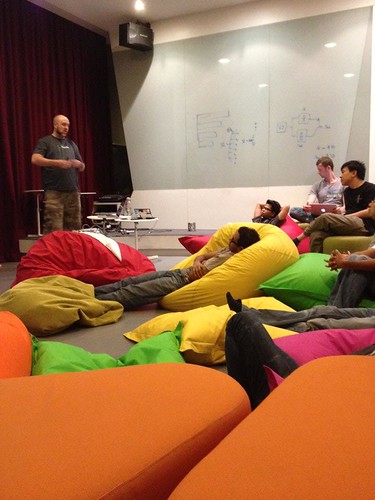So it’s kinda weird, last year I did 2 talks in the same month, 1 on WordPress (High Performance WordPress – Scaling, Tuning, Optimizing & More) & one which was more random (The History Of The Future at WebCamp KL.
This year I ended up doing 2 presentations in the same week (actually on 2 consecutive days), and once again the first was technical and the second a bit more random.
The first one was about MongoDB and was for the KL Mongo User Group AKA KL MUG. For those that don’t know what MongoDB is, it’s one of a new breed of SQL engines in the NOSQL camp – this means no more horrible SQL statements, no tables/columns/rows. Just documents being stored however you like.
MongoDB (from “humongous”) is a scalable, high-performance, open source NoSQL database. Written in C++, MongoDB features:
Here’s me with my AWESOME Linode t-shirt giving the talk.

Some useful references I used:
– Replica Sets
– Replica Sets – Basics
– Replication Fundamentals
– Replica Set Administration
– Replica Set Tutorial
– Use MongoDB to Store Application Data on Ubuntu 10.04 (Lucid)
– MongoDB Replica Sets on EC2
– Fun with MongoDB replica sets
– Recommended practice to deploy MongoDB on EC2 for production?
– MongoDB Infrastructure Tests (Part I: Setting up Replica Sets with MongoDB)
– MongoDB Monitoring: Keep in it RAM
– My Experiences with MongoDB in production over the last year
– Security and Authentication
– Ubuntu and Debian packages
– Munin plugins for MongoDB
– Munin configuration examples
The official MongoDB documentation and wiki is REALLY good, and also one of the reasons why I choose MongoDB over the others.
Don’t forget to join us on Facebook!
https://www.facebook.com/groups/klmug/
You can see all my talks given here.


Why do you suggest disabling swap? Got any refs?
Thanks!
I disable swap on ALL servers, I prefer a process to get reaped (and restarted with something like monit) than to go into swap hell. Plus I have monitoring so I’ll know I need to add more RAM. If a server starts swapping, performance drops so much and the disk bottlenecks the processing so the CPU will just lock and everything will become totally inaccessible. You can read more on it at Google, there’s plenty of discussions on this.